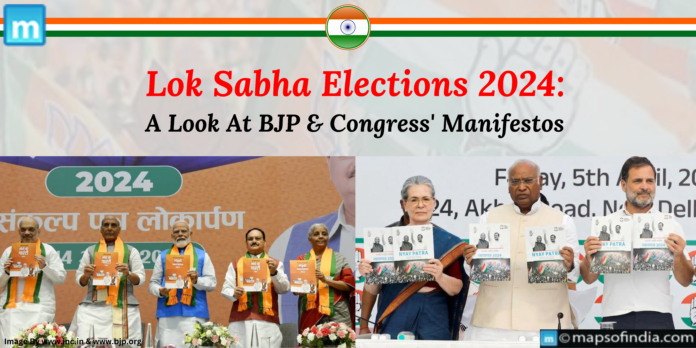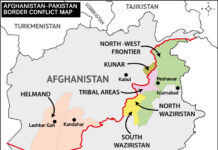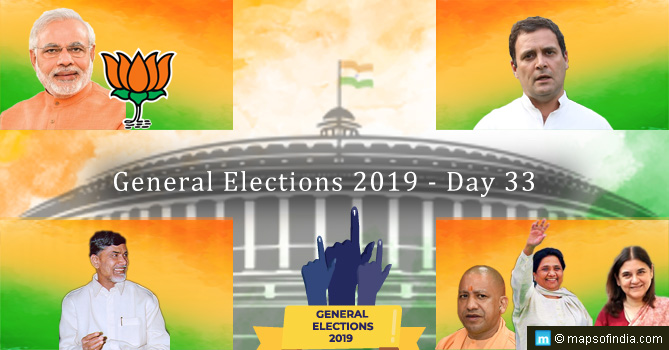The Indian National Congress (INC) and the Bharatiya Janata Party (BJP) have released manifestos detailing their goals and commitments for India’s future ahead of the Lok Sabha elections.
A Look at the Manifestos of BJP & Congress for Lok Sabha elections 2024
Unwavering in its commitment to upholding Article 370, the Uniform Civil Code, the Ram temple, and its core principles, the BJP released its 2019 manifesto, which included plans to invest Rs 126 lakh crore in infrastructure, modify tax slabs, pensions for small farmers, and expand the controversial National Register of Citizens (NRC) exercise throughout India.
The prime points of the BJP’s “Sankalp Patra” ahead of the 2024 elections are as follows:
Key highlights of the BJP Manifesto
- Prime Minister Garib Kalyan’s Anna Yojana would provide free rations to the underprivileged for the next five years.
- The party will continue to offer low-income families, under the Ayushman Bharat program, free, high-quality healthcare services up to ₹5 lakh.
- Under the Prime Minister Surya Ghar Muft Bijli Yojana, low-income homes can receive free electricity.
- It aspires to transform into “Lakhpati Didis” by empowering three crore women in rural areas.
- Women’s self-help groups (SHGs) and the service sector are integrated, improving market access for women’s SHG businesses: ensuring the construction of infrastructure, such as creches and working women’s hostels, with an emphasis on sites close to commercial and industrial areas to encourage more female involvement in the workforce.
- Expansion of the current healthcare system with an emphasis on osteoporosis, breast cancer, cervical cancer, and anaemia prevention and reduction to provide a healthy life for women.
- Launching a targeted campaign to end cervical cancer.
- Putting into practise the Nari Shakti Vandan Adhiniyam to guarantee women’s representation in state and federal legislatures.
- Implementing a law to stop paper leaks and an open government hiring procedure.
- The Ayushman Bharat Yojana is expanded to include senior adults and give them access to high-quality, accessible healthcare.
- Using the vast reach and dependability of the postal service and digital network, government services are delivered right to seniors’ doorsteps, allowing easy access to social security benefits and other crucial government services.
- Bolstering the Prime Minister Kisan Samman Nidhi program to give farmers ongoing cash help.
- Bolstering the PM Fasal Bima Yojana with more technology involvement to guarantee prompt and accurate evaluation, prompt payouts, and prompt grievance resolution.
- Raising the crop’s minimum support price (MSP).
- Establishing the Krishi Infrastructure Mission to facilitate the integrated planning and coordinated execution of agricultural infrastructure projects, including food processing, cold storage, grading and sorting units, storage facilities, and irrigation.
- Extending irrigation infrastructure and initiating technology-enabled irrigation projects to apply state-of-the-art technology for effective water management.
- Launching a domestic “Bharat Krishi” satellite to assist with agricultural tasks such as weather forecasting, irrigation, pesticide application, crop forecasting, and soil health monitoring.
- A regular evaluation of the country’s minimum salaries at the floor level.
- Participation of drivers in all social security programs, including those operating trucks, autorickshaws, and taxis.
- Enabling MSMEs and small business owners to grow their companies through technology through the Open Network for Digital Commerce (ONDC).
- A mission-mode strategy for tribal healthcare, targeted interventions to end child malnutrition, and mission-mode delivery of complete healthcare services in tribal regions.
- “Modi ki Guarantee” for a secure and thriving nation.
- Technology in the walled areas and vital infrastructure along the boundaries will make fencing more intelligent.
- The Citizenship (Amendment) Act’s (CAA) implementation.
- Elevating India’s economy to the third rank globally.
- Increase in job possibilities.
- Steps to ensure that, by 2030, India becomes a major worldwide centre for electronics manufacturing.
- The “Modi ki Guarantee” for effective leadership.
- Introducing the Uniform Civil Code.
- Accomplishing the “One Nation, One Election” goal
- Building new universities and providing high-quality education.
- Northeastern peace is preserved through balanced regional development.
- Resolving border conflicts amongst the northeastern states via persistent work.
Key highlights of the Congress Manifesto
The Congress unveiled their Lok Sabha election platform on April 5. The 48-page Nyaya Patra highlights five pillars of justice for all areas and classes: Equality is based on justice, including the justice of labourers, farmers, women, and young people.
For Different Classes
- Economic Social Caste Census conducted nationwide.
- The 50% reservation cap for Scheduled Castes, Scheduled Tribes, Other Backward Classes, and poor general classes would be eliminated.
- All open positions designated for Scheduled Tribes, Scheduled Castes, and Backward Classes shall be filled within a year.
- All members of caste communities would be treated equally under the 10% Economically Weaker Section (EWS) reservation in employment and education.
- Regular hiring will take the place of contract hiring, and current contract employees in public sector and government organizations will be made permanent.
- The land will be distributed to the landless.
- Following a thorough consultation process, the party will forward legislation to officially acknowledge civil unions between LGBTQIA+ couples.
Promises given to youth
- Cases involving question paper leaks from job exams will be heard by fast-track courts, with compensation going to the victims.
- The Apprenticeship Act of 1961 will be replaced with the Apprenticeship Rights Act to ensure employment.
- The Central Government has approved filling almost 30 lakh open positions at various levels.
- To support young people under 40 in starting their enterprises and creating jobs, Congress would revamp the Fund of Funds initiative for startups and distribute 50% of the fund, or Rs 5,000, equally among the nation’s districts. The amount allotted is Rs crore.
- The government will offer one-time help to young people who were unable to sit the government exam between April 1, 2020, and June 30, 2021, due to the pandemic.
- The government will no longer charge application fees for exams or jobs.
- The government will reimburse the banks for all student loans and waive the remaining loan balance and interest through March 15, 2024.
- Under-21-year-old gifted and up-and-coming athletes would receive sports scholarships from Congress worth Rs 10,000 a month.
Vast Aspirations for Women
- Launching a Mahalaxmi Yojana to give impoverished women from the third class of Indian households an unconditional annual allowance of Rs 1 lakh has been decided upon.
- Will permit seat reservations in the State Assembly and Lok Sabha to be implemented only after 2029.
- Beginning in 2025, women will be granted preference for half of all central government positions.
- The equal pay for equal labour principle will be implemented to stop discrimination against women.
- Women will receive a larger share of institutional credit.
- Equal rights for men and women should apply to succession, marriage, inheritance, adoption, guardianship, and other situations. We’ll review every law.
Expectations for Farmers
- Legal status will be granted to the MSP under Kisan Nyay.
- There are plans to establish a commission to waive loans and to guarantee GST-free farming.
- Labour justice promises an employment guarantee if workers are granted their right to health and get a minimum pay of Rs 400 per day.
- Agriculture-specific crop insurance will be provided.
- A formal entity will be established for CACP.
- All matters will be resolved within 30 days, and the premium will be paid to the farmer in accordance with the amount insured.
- In order to facilitate the easy transportation of farmers’ produce to customers, retail markets will be set up for them in both large and small villages.
Exciting Prospects for Education
- When the federal administration takes office, it will discuss the new education policy with the state governments and make any necessary revisions.
- The RTE Act will be amended to make education in government schools free and mandatory for students in classes 1 through 12.
- It will no longer be the case that government schools charge more for different kinds of initiatives.
- OBC, SC, and ST students would receive double the award amount. Assistance for higher education overseas would be provided to SC and ST students.
- Every block will establish a residential school network for SC and ST kids.
- Before increasing the number of Kendriya Vidyalayas, Navodaya Vidyalayas, and Kasturba Gandhi Balika Vidyalayas, the state government will be consulted.
Assurance of Upholding the Constitution
- Congress declared that “One Nation, One Election” is an ideology it rejects.
- Changing election laws to incorporate transparent ballots and effective electronic voting machines. Electronic voting machines (EVMs) will be used for voting, however voters will be able to retain and deposit the voting slips that the machine produces in the VVPAT unit. The electronic vote total and the VVPAT slip total will be compared.
- Defector MLAs and Parliamentarians will automatically lose their eligibility to serve in the Assembly/Parliament, and the Tenth Schedule of the Constitution will be altered.
- There shall be no meddling with people’s choices on what to eat and wear, who to marry and travel with, or where to live in India. Every law and rule that interferes unreasonably shall be removed.
- The two houses of Parliament will convene for one hundred days every year. Each House’s opposition benches will propose an agenda, which will be considered one day a week. Both Houses’ presiding officers must sever all ties to political parties and maintain their impartiality.
- Restoring the Planning Commission is planned.
- Law enforcement, intelligence, and investigative agencies shall operate utterly conformist.
- A commitment to stop using the law as a weapon, arbitrary searches, seizures, arrests, third-degree tactics, protracted incarceration, fatalities in custody, and bulldozer justice.





